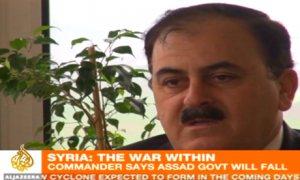The United States has repeatedly expressed its reluctance to provide Syria’s armed opposition with weapons, due to the fear that they will fall into the hands of extremists groups. At this week’s meeting in Rome, the U.S. government promised only to provide non-lethal support. It’s time for Washington and the international community to reconsider, because the only way to prevent the rise of warlords and extremist groups is to support the organized Syrian opposition in professionalizing the armed revolution.
In fact, the Syrian Coalition, an internationally recognized umbrella group of opposition parties, has made great strides to account for all advanced weaponry under the rebels’ control. It now registers and traces all such arms to ensure that only trained officers under the command ever receive and use them.
While the allies of the Syrian people have pledged little more than cautious words, the allies of the Syrian regime supply Bashar al-Assad with a steady stream of military support. A high-ranking Iranian cleric, while giving a speech to the Basij paramilitary force, recently referred to Syria as Iran’s “35th province,” and called for forming Special Forces trained in urban warfare to ensure Assad remains in power. Reports from the western city of Qusayr show that Hezbollah guerrillas already control eight villages and are moving toward controlling two more. Locals confirm that fighters dressed in Hezbollah gear are responsible for attacking civilians in these areas. Hezbollah has not made a secret out of its intervention: Its TV station, al-Manar, reported that 14 Hezbollah fighters were killed in Syria “while carrying out their Islamic duties.”
If the international community fails to provide the necessary strategic military support, it will only help to contribute to a vacuum in Syria where radical foreign forces flourish. The Syrian opposition has already made a concerted effort to bring armed revolutionary groups under the umbrella of a controlled military command — it forged the Syrian Military Joint Command, which united the Free Syrian Army (FSA) brigades under a common leadership and helps equip them with advanced weaponry to counter Assad’s military onslaught. It has also taken a number of steps to marginalize extremist groups by ensuring that all FSA battalions uphold the Geneva Convention, imposing strict age requirements for new recruits, and cutting off units that break the rules from lethal and non-lethal support.
The Syrian Military Joint Command has built strong links with FSA brigades around the country in order to develop a countrywide military strategy. But there is only so much that can be done without the determined support of the United States. What Syrians need today to bring an end to the conflict are anti-aircraft weapons systems, not more words.
The building of the new Syrian state has already begun, and the FSA battalions of today will be transformed into the post-Assad military of tomorrow. Creating strong military institutions is crucial to Syria’s democratic transition: The Syrian Military Joint Command is the first step in ensuring that the country’s army is a professional, nonsectarian force that submits to civilian governance and the rule of law. After all, the ultimate goal of the armed opposition is to bring down the regime in order to support a transition into a civil state, where free and fair multi-party elections can take place in a peaceful environment.
A professional armed opposition will help to reduce the risks of sectarian strife, revenge attacks, and a protracted civil war after the fall of Assad. Syria has long been a pluralistic haven for Kurdish, Alawite, Christian, Druze and Muslim groups — a unified military force will be committed to keeping it that way, by protecting religious and ethnic minorities and all civilians. It will also work to ensure that any chemical or biological weapons in Assad’s arsenal are documented, accounted for, and remain within the sovereign borders of the country.
It is time that the United States makes good on its many statements proclaiming its desire to bring an end to the bloodshed in Syria by providing strategic support and advanced weaponry to the armed opposition. The Assad regime’s main advantage is air bombardment, and the current weaponry of the armed revolutionaries is insufficient to counter the regime’s warplanes and Scud missiles. But even as the Iranian regime is sending elite forces to Assad’s aid, and Hezbollah fighters flow in across the border with Lebanon to fortify the Syrian military, the opposition’s allies sit on the fence.
It’s time for this policy to end. The United States’ hands-off approach in Syria is only exacerbating the conflict by allowing anti-American and extremist elements to gain a stronger foothold in the country. Without a new, more aggressive strategy from Washington, a stable and peaceful transition to a democratic society will become an increasingly distant goal, and the bloodshed will only continue.
FP


Leave a Reply
You must be logged in to post a comment.